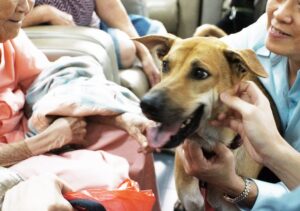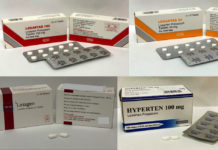
I lost my son and best friend, Bacon, last week. He was getting older, but still very healthy, as he has always been for all his life. He was estimated to be 14yrs old, but we do not know for sure, because he was already an adult when we rescued him off the streets from being culled.
A Deadly Disease Which Progressed Really Fast
I was going away to Hanoi for a work trip in the morning. Bacon was still well and eating breakfast before I left.
In the late afternoon, I received a call from Marlyn, my live-in helper, that he looked unwell. It was a Sunday, and by then, most vets were already closed, or closing. The vet she tried to bring him to were not seeing any dogs without an appointment and turned her away.
At last, we found a vet to bring him to in the evening, who ran bloods and diagnosed him with gastric torsion. But they too were closing and he had to be transferred to another vet for emergency surgery.
By the time the 2nd vet placed him under and opened him up, much of his stomach and spleen had already undergone necrosis, or cell death from prolonged lack of blood supply. There was no way to save him, and the only thing left to do was to let him go. At 230am, I gave the vet permission to euthanize him. Bacon never woke up from surgery.
What is Bloat, or Gastric Dilatation Volvulus?

Gastric Dilatation Volvulus (GDV), commonly known as Bloat, is a serious condition affecting dogs where the stomach fills up with gas, food or fluid and twists onto itself. It is always fatal when left untreated. Most cases of bloat are this more serious subtype.
A less serious form of bloat, known as “simple bloat” occurs when the stomach distends without twisting. This may resolve on its own, but may also progress to the life threatening GDV.
When the distended stomach is twisted, the gas, food of fluid cannot empty into the intestines. This results in the blood flow to the stomach and the surrounding organs such as the spleen and intestines being compromised. Just like a heart attack, the organs quickly die when the blood supply is cut off, with necrosis (death) of the organs. The distention presses on the large blood vessels, preventing blood from returning to the heart. The systemic circulation is compromised, leading to shock (low blood pressure), and the dog’s rapid and painful demise.
GDV is a deadly disease. The death rate varies from 15% – 38%, depending on the degree of organ involvement and how timely medical treatment is given.
What Causes Bloat? What Factors Make It Likely?

Bloat can affect any dog. It typically occurs 3-4 hours after a large meal, but there are some risk factors, some which we cannot control. These are the risk factors you cannot modify:
- Dogs with a deep, narrow chest (tall), rather than wide are affected more. Great Danes are 5-8 times more prone to bloat compared to wider dogs.
- Larger dogs are at risk compared to smaller ones. Dogs above 45kg are at a 20% of developing bloat in their lifetime.
- Dogs with a fearful, anxious, or hyperactive temperament.
- Male dogs
- Genetics. Dogs with a sibling/ parent who suffered from bloat are more likely to get it.
- Older dogs (above 7yrs of age)
- In Singapore, bloat is most commonly seen in Singapore Specials, who are often larger, deep chested, and have a fearful temperament
There are some factors you can control which predispose to bloat:
- Eating 1 large meal per day rather than 2 or more small meals. Dogs eating 1meal a day have twice the chance of developing bloat compared to those eating 2 meals
- Drinking large amounts of water too quickly
- Exercise immediately after eating
- Elevated food bowls may increase risk of bloat.
What Can You Do to Prevent Bloat?
The things you can do, include:
- Feeding 2 or more small meals rather than 1
- If your dog is on a commercial diet (of kibbles, canned food etc), feed a combination of wet and dry food. This allows the kibbles to absorb water and expand prior to ingestion.
- Preventing your dog from eating too quickly by using slow feeder bowls, or feed using a muffin trays or a bundt baking pan. You can also place rocks in the bow. (use only large rocks so they don’t swallow the rocks)
- Reduce anxiety during feeding by separating your dogs at meal time if you have more than 1 dog
- Preventing them from drinking too much water at once. Always have fresh water readily available so they do not gulp it all at one go when thirsty.
- Avoid exercise before and after a meal – if a dog exercises before its meal, it can swallow too much air when eating. Similarly, try to wait 30-60minutes after feeding before walking your dog, and wait 2 hours before strenuous exercise such as a run.
- Preventive surgery if your dog is at high risk. – prophylactic gastropexy, or stitching of the stomach to the body wall to prevent twisting.
What Treatment Measures/ First Aid can I Take When Bloat Occurs?
Whether your dog survives GDV depends entirely on how soon you can bring it to medical attention. The vet will need to resuscitate your dog with intravenous fluids to stabilize him/her, and relive the distention by passing a gastric tube, which may or may not work. Surgery is needed to untwist the stomach, then stitch it to the abdominal wall (gastropexy) to prevent it from twisting again. If some parts of the stomach, or the spleen has died, it needs to be removed as well.
Medical intervention needs to given within 2 hours for a good chance of cure, and therefore, adequate preparation is key for your dog’s survival.
1. Regconize the Symptoms and Signs
Recognizing Bloat is the first and most important step in saving your canine friend. The symptoms occur suddenly, and get worse quicky. The symptoms which should make you suspect bloat are:
- Non-specific distress – anxiety, listlessness, restlessness, pain
- Attempting to vomit without being able to throw up
- Abdominal distention and pain
- Painting, rapid breathing
- Collapse – a late sign.
A characteristic sign is bloating of the abdomen, with pain when you press on it. When you percuss on it (tap with finger) it is tight and taut and filled with air, like a drum. When you see this, act immediately. Always have a high index of suspicion as our canine friends cannot talk can tell us what is causing them distress. By the time we realise something is wrong, it is often too late, like what happened with my poor baby.
2. Always Have Someone Around or Who can Watch Them
If you have at-risk dogs, try to always have someone around even when you have to be at work or be overseas. If you are overseas on your helper’s off day, ask if she can stay in, or come back earlier to check on your dogs. In cases having someone around is impossible, consider installing IP cameras to keep watch over your dogs, or Ask your neighbours for help to alert you if they hear your dogs whining or if they see anything amiss.
3. Know Where to Get Medical Attention Immediately
Please know where to bring your dog for help, especially after hours, on Sunday, and public holidays when your regular vet may be closed. Always have a list of the 24hr Emergency vets available in your area. If you are overseas, make sure your dogs’ caregiver whos where to seek help immediately.
Call the clinic in advance to inform them you have a medical emergency, so that you do not have to wait in the queue and waste precious time. Go straight to the vet hospital who can perform definitive treatment for your dog. Please do not make the same mistake as me, by sending to a vet who was closing and could not treat my dog, resulting in hours wasted, and his death.
Please see the list below for the 24hr Emergency Vets you can bring your dog to in case of bloat, and other medical emergencies.
Bloat Does Not Have To be Fatal. Don’t Make The Same Mistakes As I Did
With increased vigilance, early recognition of the condition and timely treatment, there is a good chance that your dog will survive this dreadful condition. If you are well prepared, you can know what to do immediately when it happens, and save precious minutes which can mean the difference between life and death for your dog.
In Bacon’s time of need, I failed to act quickly enough to save my best friend’s life. Our canine friends long to be with their loved ones, especially when they leave this world. But Bacon did not have that chance. He went to sleep excepting to wake up, back home with me. But that never happened. He died, alone, on a cold surgical table, while I, the person he loved the most, ordered his death from hundreds of miles away. Please do not let the same thing happen to you and your dog. It will haunt you, for the rest of your life. And you will find yourself waking up in tears, wishing you could have done better.

Bacon has done a lot of good in his life. Ever since his rescue in Dec 2011, he was involved in the many initiatives which SOSD Singapore implemented over the past decade, paving the way for a better life for hundreds of stray dogs after him. I hope that through this article, his legacy will continue to live on, and that he will continue to do good and save more canine friends, even though he is no longer around.

In loving Memory, Bacon, Son and Best Friend
2008 – 20 Feb 2023
List of 24hr Emergency Vets in Singapore:
- Beecroft – 991E Alexandra Rd, #01-27, Singapore 119973, Tel 6996 1812
- Westside Emergency Vet – 41 Eng Kong Terrace, Singapore 599013, Tel 6463 7228
- Mount Pleasant Veterinary Centre (Gelenggang)– 2 Jln Gelenggang, Singapore 578187, Tel 6251 7666
- Advanced VetCare (Bedok)– 18 Jalan Pari Burong, Picardy Gardens, Singapore 488684, Tel 6636 1788
- VES @ Whitley– 232 Whitley Road Singapore 297824, Tel 6266 0232
- Animal Wellness Referral Centre – No 200, Bukit Timah Road, Singapore 229862 Tel 6530 3530

















